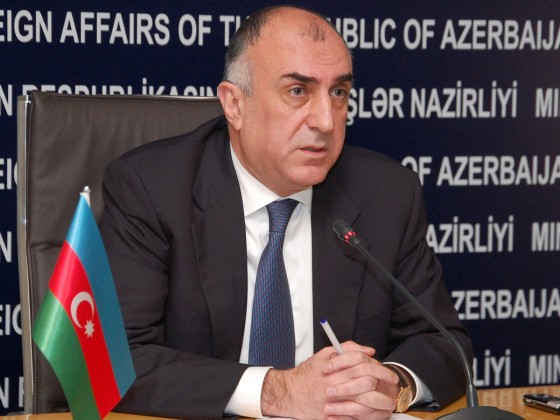
Azerbaijan regrets that the UN resolutions on the liberation of the country’s occupied territories are still ignored by Armenia, Azerbaijani Foreign Minister Elmar Mammadyarov said in Baku Oct. 23.
Mammadyarov made this statement at a joint conference entitled ‘Azerbaijan and Sustainable Development Goals’ of the foreign ministry and the United Nations.
Mammadyarov stressed Azerbaijan’s commitment to continue the peace talks.
The Azerbaijani foreign minister also said that the status quo is unacceptable and poses a danger to the entire region.
“In response to the occupation of territories of Azerbaijan by Armenia, numerous resolutions were adopted by the UN Security Council and UN General Assembly condemning the occupation of the territories of Azerbaijan and reaffirming respect for its sovereignty and territorial integrity and the inviolability of its internationally recognized borders,” he said. “The fact that those resolutions remain on paper does not serve the credibility of the UN.”
“The Government of Armenia must realize that the military occupation of a territory of another State does not represent a solution and its reliance on the status-quo is wrong, counter-productive and dangerous,” he said.
Mammadyarov said that on human dimension, Azerbaijan continues to promote tolerance, multiculturalism and understanding among peoples.
“Over the past seventy years, the United Nations have decisively established itself as the universal organization working for the noble cause of maintaining international peace and security,” he said.
Mammadyarov said that to our deepest regret, the world continues to face deterioration of the international security situation and increased human suffering, which requires huge resources from the United Nations.
“Azerbaijan has contributed with its military personnel to the UN-mandated peacekeeping operations in various parts of the world to advance the efforts for maintenance of international peace and security,” he said.
"Azerbaijan takes an active part in international organizations and helps to strengthen the relations between the UN and the OIC," he said.
The conflict between the two South Caucasus countries began in 1988 when Armenia made territorial claims against Azerbaijan. As a result of the ensuing war, in 1992 Armenian armed forces occupied 20 percent of Azerbaijan, including the Nagorno-Karabakh region and seven surrounding districts.
The two countries signed a ceasefire agreement in 1994. The co-chairs of the OSCE Minsk Group, Russia, France and the US are currently holding peace negotiations. Armenia has not yet implemented the UN Security Council’s four resolutions on the liberation of the Nagorno-Karabakh and the surrounding regions.
Trend
